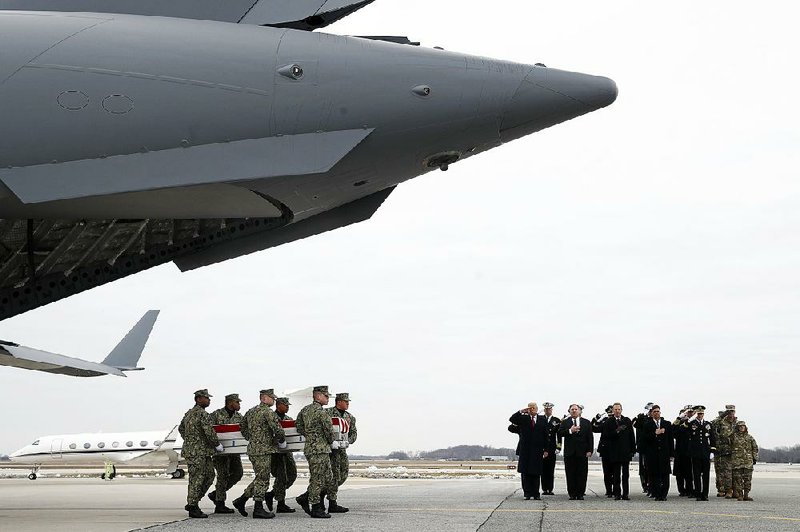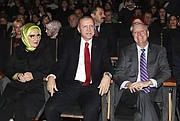ANKARA, Turkey -- A rapid U.S. withdrawal from Syria would lead to an "Iraq on steroids," Sen. Lindsey Graham warned Saturday.
Graham spoke to reporters in the Turkish capital, Ankara, a day after meeting with Turkish officials, including President Recep Tayyip Erdogan. The South Carolina Republican said he was on a mission to ensure that the U.S. withdrawal announced by President Donald Trump in December did not cause greater damage that would be against U.S. interests in the long run.
"I can understand the desire to withdraw, but withdrawal without a plan is chaos," Graham said. "It would be Iraq on steroids," he warned, in a reference to how the Islamic State extremist group gained power after the withdrawal of U.S. forces from the country in 2011 under President Barack Obama.
"I am urging President Trump not to do what President Obama did, which is just to get out and not to understand what happens when you just get out," he said.
The withdrawal of U.S. forces from Iraq in 2011 was planned in 2008 under President George W. Bush, who said at the time that the withdrawal would be possible because of the success of the 2007 surge of U.S. troops. But in 2014, Obama redeployed troops to Iraq at the invitation of the government to stop Islamic State militants from advancing on Baghdad.
Some 5,200 troops remain in Iraq today, and the Islamic State was defeated in its last urban stronghold only a year ago.
Graham said any plan to withdraw from Syria should ensure that the Islamic State group is defeated, that Iran is contained and that Turkey is protected from threats from Kurdish rebels.
Graham met Friday with Erdogan for more than two hours, and described it as a "direct and productive meeting." Then, on an impromptu invitation from the Turkish president, the senator joined him at a concert by Turkish pianist Fazil Say, which Graham described as one of the best evenings of his life.
Turkish officials have not commented on Graham's meetings in Ankara beyond confirming that they occurred. Defense Minister Hulusi Akar, who also met Friday with Graham, said in a statement that the United States had not kept its promises to remove the Kurdish People's Protection Units from the northern Syrian town of Manbij, and promised that Turkey would continue to combat terrorism along its border.
Graham said that Trump's plan for a withdrawal could be achieved, but with more time for planning. The 2,000 U.S. special operations forces troops in northeastern Syria could be withdrawn and replaced with a new mission and a smaller force to ensure the Islamic State militants did not resurface, he said.
Graham has long criticized the United States' policy of arming and training the Kurdish People's Protection Units, saying that it works against the interests of Turkey, a strategic ally of the United States and NATO. The Kurdish People's Protection Units is affiliated with the Kurdistan Workers' Party in Turkey, which the United States and Turkey have designated as a terrorist organization.
Trump has raised the possibility of creating a "safe zone" at the border with Turkey, but Turkish officials also worry that such a Kurdish-run zone would destabilize their country.
Graham's trip came after Erdogan canceled a meeting in Turkey with the White House national security adviser, John Bolton. Erdogan was angered that Bolton had said in Israel that Turkey would be forced to ensure that Kurdish forces were protected.
The senator said Saturday that for the U.S. to withdraw and leave the Kurdish fighters with U.S. weapons was "insane." He said Turkey would be driven to take military action inside Syria, creating a broader war.
"That would be putting Turkey in a terrible spot," he said in an interview before the briefing. "That can all be avoided if we slow this down."
REMAINS RETURNED
The war in Syria killed four Americans last week, and Trump traveled Saturday to Delaware's Dover Air Force Base to pay his respects as their remains were returned.
The president stood solemnly and saluted the coffin holding the remains of civilian Scott Wirtz of St. Louis as it was carried from a C-17 military aircraft into a waiting van.
Wirtz and the three other Americans were killed in a suicide bombing Wednesday in Manbij in the deadliest assault on U.S. troops in Syria since American forces moved into the country in 2015.
Wirtz had been assigned to the Defense Intelligence Agency as an operations support specialist.
The three other transfers were to be conducted privately, with the president observing. He also spent time with the grieving families.
The trip was not listed on the president's public schedule that was released Friday night, but he tweeted the news in the morning.
"Will be leaving for Dover to be with the families of 4 very special people who lost their lives in service to our Country!" he wrote. He later told reporters as he left the White House on Saturday that "when I'm going to meet relatives of some of our great, great heroes that have fallen, I think it might be the toughest thing I have to do as president."
The Islamic State group claimed responsibility for Wednesday's attack in Manbij, which killed 19 people, including the four Americans.
In a Dec. 19 tweet announcing the withdrawal from Syria, Trump said, "We have defeated ISIS in Syria, my only reason for being there during the Trump Presidency," using an acronym for the Islamic State. He said the troops would begin coming home "now." That plan triggered immediate push-back from military leaders and led to the resignation of Defense Secretary James Mattis.
As Graham prepared to leave Turkey on Saturday, he said that the Islamic State had not been defeated, contrary to Trump's tweet.
"If you walk away, ISIS will come back and create a nightmare," Graham said in an interview. Turkey's strategic concerns have to be taken into account, and Iran has to be kept from seizing Syria's oil fields, he added.
Trump said before arriving in Dover that the Islamic State has lost almost all its territory, but "that doesn't mean you're not going to have somebody around." He also said "we can be pulling back, but we've been hitting ISIS very hard over the last three weeks ... and it's moving along very well."
Manbij is the main town on the westernmost edge of Syrian territory held by the U.S.-backed Syrian Kurds, running along the border with Turkey. Mixed Kurdish-Arab Syrian forces liberated Manbij from the Islamic State in 2016 with help from the U.S.-led coalition.
'BETWEEN TWO FIRES'
Extremist rivals of the Islamic State also remain a concern in Syria, especially after fighters with Hayat Tahrir al-Sham forced their rivals to surrender in the country's final rebel-held pocket.
The surrender increases the likelihood of a showdown with Syrian government forces.
Hayat Tahrir al-Sham was formed from several other militant groups, notably Jabhat Fatah al-Sham. That group was formerly known as the Nusra Front, but it changed its name when it renounced its ties to al-Qaida, which itself had openly split from the Islamic State group.
Now the extremist fighters of Hayat Tahrir al-Sham in the northern province of Idlib have said that their most powerful rivals had agreed to cede control of their strongholds and hand the administration over to an authority backed by the Islamist militants.
Until now, the area has been spared a potentially devastating government offensive after a cease-fire deal in the fall between Russia and Turkey, which both have forces inside Syria.
Their agreement stipulated that "radical terrorist groups" be removed from a buffer zone between the Syrian government and opposition forces with the implicit understanding that Turkey -- the rebels' primary backer -- would be the one to achieve that.
It never happened. Turkey was unable or unwilling to remove the militants, effectively creating an extremist-controlled statelet guaranteed by international powers.
In interviews with civilians in Syria, the same Arabic phrase arose time and again. They were, they said, "trapped between two fires."
"It's extremists on one side and the regime on the other," said one aid worker, who asked to remain anonymous out of fear for his safety. "What did we do to deserve this? I don't recognize my country anymore."
Information for this article was contributed by Carlotta Gall of The New York Times; by Louisa Loveluck and Zakaria Zakaria of The Washington Post; and by Jill Colvin of The Associated Press.
A Section on 01/20/2019


